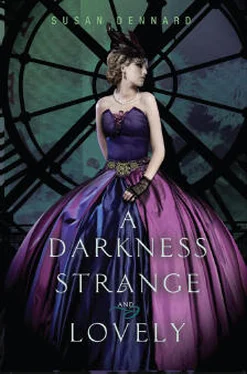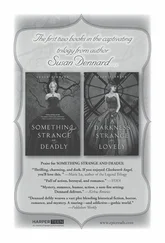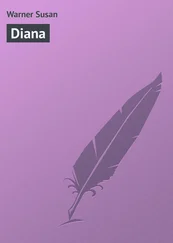According to Kent Lang, heir to the Lang Company, which operates out of New Orleans and owns the Sadie Queen , “We hope that winning this race will prove to potential passengers that the integrity of the Lang Company’s fleet has not been affected by the hauntings.”
Yet even with a win for the Queen , this Picayune reporter speculates nothing can bring back the steamer’s glory days.
I reached the final line—a line I was inclined to agree with—and noticed that a familiar clack-clack-clack, thwump!, clack-clack-clack had filled the room. I lifted my eyes to Cassidy. She held her tarnished old spyglass and was extending it. Clack-clack-clack . Then snapping it shut. Thwump! Open, shut, open, shut—she always did that when she was nervous.
The electric lamplight flickered on her hair, making the mahogany color shine red. Her eyes met mine, and a grin spread over her lips. Clack-clack-clack, thwump! “Well?” She dropped the spyglass in her pocket.
“It wasn’t an optimistic article,” I said cautiously. “The reporter said we’re doomed no matter—”
“I don’t care what the reporter said.” She grabbed my wrists, rocking back and forth on her heels. “Dunlap accepted Father’s challenge. That means we’ll go back to New Orleans tonight to get as prepped as we can before the race next week. If we win—and by God, we have to, Danny—then the Langs won’t shut us down.”
Won’t shut us down yet, I thought. But I kept the sentiment to myself. What the Sadie Queen needed was passengers, and if she didn’t get some soon, the Lang Company was going to take her—and all her crew—off the river. I didn’t think a race would change that.
Cass must’ve realized the direction of my thoughts because her smile faltered . . . and then fell. She released my wrists. “You don’t think we can win?”
“Of course I do.” I slung off my flat cap and scrubbed at my scalp. “You’re the best apprentice pilot on the Mississippi.”
“Damn straight.” She stomped one heel and set the command bells—an array of all sizes that hung on a column between the engines—to ringing. “And you’re the best striker on the Mississippi. No engineer is as fast as you.”
“So there you have it.” I spread my hands. “We’ll whip Captain Dunlap and the Abby Adams . Me and you. A team.”
“A team,” she repeated. Then she punched the air and gave a loud whoop. “We’ll whip ’em, all right.” But almost instantly her arm dropped . . . and her smile crumbled. “I wish Ellis could see it.”
Ellis. Cassidy’s little sister. I’d only met the girl once, but it had burned her image in my brain—a neck swollen wider than her head and a life confined to a hospital bed.
“Hey now.” I tugged my cap back on. Winning a race wasn’t going to change Ellis’s fate, and I wasn’t about to let Cassidy lose hope already. “What was the very first thing I told you when we met?”
Her forehead bunched up, replacing her frown. “I don’t know. That was a year ago, Danny.”
I took a step toward her. “I said that if anyone could tame the Mississippi, it would be you.”
She gave a sly, satisfied smile—my favorite kind. “How could I forget that? I usually catalog all your compliments up here.” She tapped her temple. “I’ll just file that one under M for ‘Mississippi.’ Or should I make it T for ‘taming’?”
I laughed, but before I could summon a worthy response, her eyes widened. “Why are you half dressed?”
“Are you just now noticin’?” A blush warmed my face, and I tugged my shirt collar closed. “I’ve got to put on my coveralls and clean the boilers.”
“But didn’t you just clean the entire engine room? Where’s Murry? Or Schultz?”
“Schultz is seein’ his family today, and Murry’s old and half blind.”
She frowned. “That doesn’t make it all right to shirk.”
“It ain’t shirkin’, Cass.” I swatted the air. “I’m the striker. It’s my job to keep everything clean and running smooth.”
“You may be the apprentice, but you do the same work as the full engineers.” She pushed out her chin. “In my book that means the full engineers should help you from time to time too. I’m only the cub pilot, but Father still shares the work with me fifty-fifty. We have to since we’re only a skeleton crew these days.” She planted her hand on her hip. “Should I say something to Father?”
“No.” I shook my head quickly. The last thing I wanted was for Captain Cochran to lose his temper. Especially at Murry. The rumor was that all the burn scars around Murry’s eyes—and the reason the Chief Engineer could barely see anymore—was because Cochran had shoved the man’s face in a boiler furnace.
I didn’t know if that was true, but it wouldn’t have surprised me. The captain had a temper, and as a rule, I avoided that temper at all costs.
“All right,” Cass said slowly. “I won’t say anything. . . . But don’t let Murry overwork you. This team”—she motioned between us—“won’t work if one half is broken.” She twirled around to leave, a whoop already bursting from her lips. “We’re going to race, Danny Sheridan, and we’re going to win!”
I watched her go, hair falling from her bun, and prayed she was right. Because if we didn’t, then the Sadie Queen and all her crew really were doomed.
Once I’d donned my coveralls and snagged a chain from the blacksmith’s office beside the engine room, I stalked out to the Sadie Queen ’s Main Deck. My mind was still on Cass. On the hug. On the way her hips had felt beneath my fingers . . .
I swallowed and cleared my throat. Cassidy Cochran was my best friend—no matter how much I might’ve wished otherwise. She was the captain’s daughter; I was a lowly engineer’s striker. Trying to make more of that would only ruin the friendship we had. One day I might be a full engineer—no more scrubbing boilers or following Murry’s orders—but that day was a long ways off.
I stepped into the midmorning sun and took in the Sadie Queen . Everything about her catered to the lap of luxury—from the filigreed, whitewashed balustrades and elegant windows to the lush, costly interiors. Four floors of opulence: the Main Deck, with the engine room and space for cargo; the Passenger Deck above it, with the enormous saloon and sixty-one (now empty) passenger cabins; the Hurricane Deck, with a nice area for viewing the river and fifty more, empty cabins; and finally the Texas Deck, with the crew’s staterooms. It was no wonder we normally needed hundreds of crew—from waiters to footmen to cooks—to serve all those hundreds of passengers.
Of course, that was normally, and we hadn’t been “normally” since the ghosts had arrived back in April.
Towering over it all were two cherry-red smokestacks and the jack staff—a pole at the ship’s front with a navy flag and the words “Lang Company” in curly red script. Below the flag were the two pairs of golden racing horns we’d won . . . back before the ghosts had taken over. Back when we’d still had passengers.
I sighed and swung my gaze toward Natchez. The city stared down at me from atop a green hill. The muddy wharf at the foot of the hill crawled with burly roustabouts, their job to unload cargo from the few steamers that had already arrived. They were also bringing new cargo down to the Sadie Queen . Tobacco and cotton weren’t nearly as lucrative as luxury passengers, but they kept the steamer afloat.
And they didn’t mind the ghosts.
I strode to the ship’s front, where the boilers stood. They were outside so air could whip through the attached furnaces and keep the fires stoked. These eight long tanks served as the intestines of the ship. If they got clogged with mud, they didn’t work. It was one of the striker’s jobs to clean the boilers because, as a rule, we were younger and smaller than the engineers. While I was certainly thinner than Murry or Second Engineer Schultz, I was a full head taller. In fact, I had to fold my body near in half to get into the tank, and if there was one way I didn’t want to die, it was trapped inside a boiler.
Читать дальше












